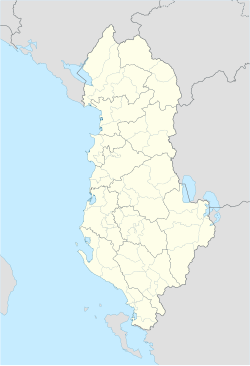Terihat
Terihat
Τεριαχάτες | |
|---|---|
| Coordinates: 39°59′12″N 20°13′02″E / 39.98667°N 20.21722°E | |
| Country | |
| County | Gjirokastër |
| Municipality | Dropull |
| Elevation | 250 m (820 ft) |
| Time zone | UTC+1 (CET) |
| • Summer (DST) | UTC+2 (CEST) |
Terihat (Albanian: Terihati, Greek: Τεριαχάτι/Τεριαχάτες; romanized: Teriaháti/Teriahátes) is a village in Gjirokastër County, southern Albania.[1] At the 2015 local government reform it became part of the municipality of Dropull.[2] It is inhabited solely by Greeks.[3]
Demographics
[edit]In the Ottoman register of 1520 for the Sanjak of Avlona, Terihat was attested a village in the timar of Is'hak, son of Mahmud. The village had a total of 58 households. The anthroponymy attested belonged almost entirely to the Albanian onomastic sphere, characterised by personal names such as Bardh, Deda, Gjin, Gjon, Kola, Leka, and others. The village also had a small number Muslim households.[4] According to Ferit Duka, the lack of names ending with -s implies a lack of Greek names. According to Doris Kyriazis, Duka's argument is wrong because the absence of the final -s does not show a lack of the Greek element, as this was quite typical in Ottoman records on areas that were undoubtedly Greek-speaking. Another discrepancy, according to Kyriazis, was that Duka ignored the etymology of the local topology and the presence of archaic Greek place names that the Slavs had translated into their own language.[5]
According to Ottoman statistics, the village had 453 inhabitants in 1895.[6] The village had 626 inhabitants in 1993, all ethnically Greeks.[3]
References
[edit]- ^ "Location of Terihat".
- ^ "Law nr. 115/2014" (PDF) (in Albanian). p. 6371. Retrieved 25 February 2022.
- ^ a b Kallivretakis, Leonidas (1995). "Η Ελληνική Κοινότητα της Αλβανίας υπό το Πρίσμα της Ιστορικής Γεωγραφίας και Δημογραφίας [The Greek Community of Albania in Terms of Historical Geography and Demography]" (in Greek). Εκδόσεις Σιδέρης. p. 58. Retrieved 2 February 2015.
- ^ Duka, Ferit (1990). "La Realite Ethnique De Dropull Dans Les Sources Historiques Du XVI Siecle". Studia Albanica (2): 19–20.
Village Terihat, région de Dropull, timar d'Is-hak, le fils de Mahmud 1 - Leka Kola 10 - Tika Guma 2 - Deda Kola 11 • - Andria Dusha 3 - Nika Kola 12 - Gjon Dusha 4 - Deda Leka 13 - Gjin Dhima 5 - Petri Bici 14 - Petri Tupe 6 - Dhimo Zokrat 15 -• Andria Tupe 7 - Deda Guma 16 - Deda Gjon 8 - Gjin Guma 17 - Dhimo Petri 9 - Dusha Guma 18 - Petri Marka 19 - Miho Todr 40 - Gjin Guma 20 - Gjon Todr 41 - Koli Deda 21 - Gjon Martin 42 - Miha Deda 22 - Mihal Martin 43 - Gjin Leka 23 - Todër Marin 44 - Qesar Leka 24 - Gjin Gjon 45 - Nika Qolçe 25 - Dhimo Deda 46 - Muzhaq Marko 26 - Martin Mihal 47 - Vasil Zokrat 27 - Brat Mihal 48 - Gjirkuç Leka 28 - Deda Gjon 49 - Pétri Gjirkuç 29 - Gjon Leka 50 - Tupe Deda Rus 30 - Gjon Andria 51 - Gjin Dhimo Rus 31 - Deda Todr 52 - Deda Guma Rus 32 - Pal Sava 53 - Dhimo Deda Rus 33 - Pétri Nika 54 - Gjon Dusha 34 - Leka Bogdan 55 - Guma Dusha 35 - Muzhaq Pétri 56 - Nika Guma 36 - Gjon Dusha 57 - Veuve de Dukë 37 - Andria Dusha 58 - Terrain d'Andria Dushë 38 - Guma Dusha en possession de Hoxha 39 - Dhimo Pétri (?) Sarës (?) et Merzikut(?
- ^ Kyriazis, Doris K. (2018). "Language contact and onomastics: tautological constructs, folk etymologies and some methodological issues". Romanoslavica. LIV (3): 161–170. ISSN 2537-4214. Retrieved 4 August 2022.
- ^ Μιχάλης Κοκολάκης, "Η τουρκική στατιστική της Ηπείρου στο Σαλναμέ του 1895" στο Βασίλης Παναγιωτόπουλος, Λεωνίδας Καλλιβρετάκης, Δημήτρης Δημητρόπουλος, Μιχάλης Κοκολάκης και Ευδοκία Ολυμπίτου (επιμ.), Πληθυσμοί και οικισμοί του ελληνικού χώρου. Ιστορικά μελετήματα, Ινστιτούτο Νεοελληνικών Ερευνών/Εθνικό Ίδρυμα Ερευνών, Athens 2003, p. 278


